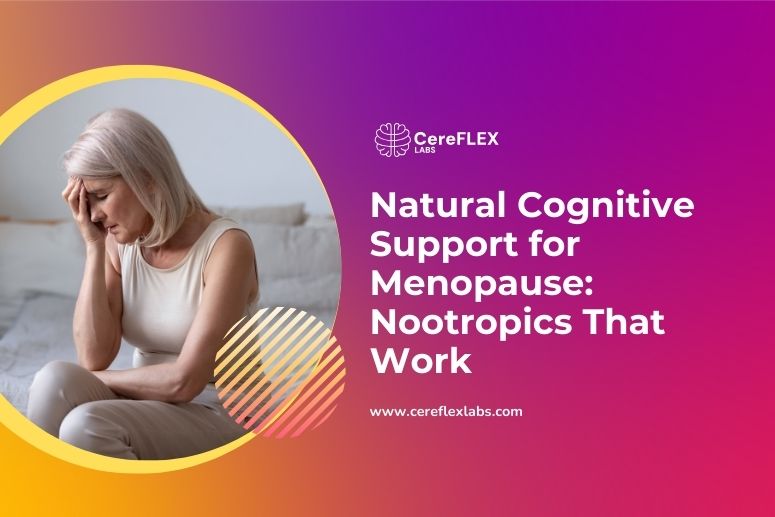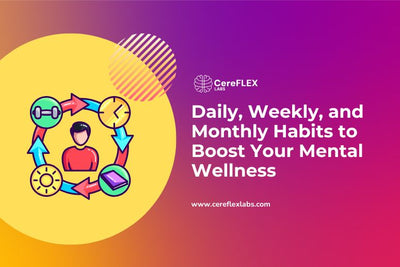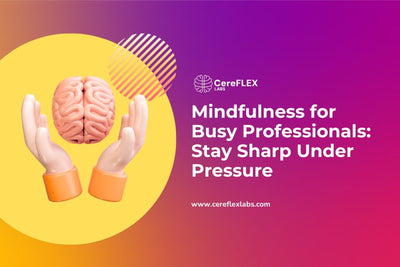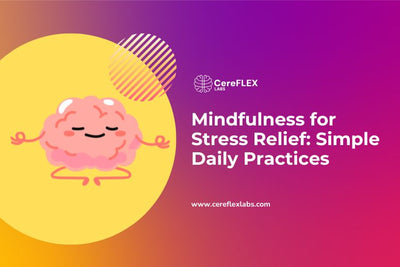Menopause is a natural phase of life, but it comes with challenges. Many women experience brain fog—a mix of forgetfulness, trouble focusing, and mental fatigue. Mood swings also become common, making daily life unpredictable. These symptoms are primarily linked to hormonal changes, particularly the decline in estrogen, which plays a crucial role in brain function and emotional stability.
While menopause is inevitable, brain fog and mood swings don’t have to be. Many women find relief through natural brain-boosting supplements for women, which help enhance mental clarity, focus, and mood during this transition.
By supporting neurotransmitters and overall brain health, nootropics can help restore cognitive sharpness and emotional balance, empowering women to navigate menopause with confidence.

What is menopausal brain fog?
Many women going through perimenopause and menopause experience mental sluggishness, forgetfulness, and difficulty concentrating. This condition, known as menopausal brain fog, can make daily tasks more challenging, impacting productivity, confidence, and overall well-being.
Common Symptoms of Menopausal Brain Fog:
- Forgetfulness – Difficulty remembering names, appointments, or recent conversations.
- Trouble Concentrating – Struggling to focus, read, or process information efficiently.
- Mental Fatigue – Feeling mentally drained, even after a full night’s sleep.
- Slower Cognitive Processing – Difficulty multitasking or keeping up in conversations.
Menopausal brain fog can be frustrating, but it does not signal permanent cognitive decline. Its primary cause is hormonal fluctuations, particularly the decline in estrogen, which plays a crucial role in memory, focus, and neurotransmitter regulation.

Mood Swings and Emotional Health During Menopause
Menopause triggers hormonal fluctuations, particularly a drop in estrogen, which plays a key role in regulating mood, stress response, and cognitive function. These shifts can directly cause mood swings, irritability, anxiety, and fatigue by affecting serotonin and norepinephrine—neurotransmitters linked to mood stability and emotional well-being.
In addition to hormonal changes, poor sleep quality can intensify emotional fluctuations. Night sweats and hot flashes often disrupt sleep, leading to mental fog, heightened stress, and increased irritability. Over time, chronic sleep deprivation can worsen mood swings and contribute to feelings of depression, anger, and anxiety.
If you're looking to manage depression after menopause, understanding these hormonal shifts is crucial. The good news? Nootropics and lifestyle changes can help enhance brain function, stabilize mood, and support emotional balance.
But which supplements are truly effective, and how can they help you feel better during menopause?
How Nootropics Work for Cognitive Health and Mood Balance
Nootropics enhance neurotransmitter activity, particularly serotonin, dopamine, and acetylcholine, which play a crucial role in mood regulation, focus, and memory. By balancing these brain chemicals, nootropics help reduce brain fog, improve concentration, and stabilize emotions, making them effective for managing menopause-related cognitive and emotional challenges.
Additionally, certain nootropics support hormonal balance, helping the body adjust to lower estrogen levels—a key factor in cognitive decline and mood fluctuations during menopause. They also protect brain cells from oxidative stress and inflammation, which are known to accelerate mental fatigue and memory loss with age.
However, not all nootropic supplements are created equal. To experience real benefits, it's essential to choose high-quality products backed by scientific research, rather than relying on unproven claims. Look for clinically tested ingredients that are proven to support brain function and emotional well-being.
What are the best nootropics for managing menopausal brain fog?
Several research-backed nootropics can help combat brain fog, mood swings, and cognitive decline during menopause. These supplements support neurotransmitter balance, hormone regulation, and brain health, offering natural relief from menopause-related cognitive challenges.

Lion’s Mane Mushroom
Lion’s mane (Hericium erinaceus) is known for its cognitive and mood-enhancing properties. This medicinal mushroom stimulates nerve growth factor (NGF), which plays a crucial role in brain function and neuroplasticity.
A randomized, double-blind, placebo-controlled study found that participants who took 1.8 g of lion’s mane showed faster cognitive performance within an hour and reported lower stress levels after 28 days.1
Another study on menopausal women suggested that lion’s mane may reduce depression, anxiety, and irritability, helping improve focus and emotional balance.2
Ashwagandha
As a powerful adaptogen, ashwagandha supports hormonal balance, stress resilience, and cognitive function. It influences the endocrine system, which regulates mood, stress, and hormone production, making it particularly beneficial for menopause.
A study on perimenopausal women found that taking 300 mg of ashwagandha twice daily significantly reduced menopause-related symptoms, including psychological stress, fatigue, and anxiety. It also increased estradiol levels while lowering FSH and LH, suggesting its potential to help regulate hormonal imbalances.3
Rhodiola Rosea
Rhodiola is another adaptogen that enhances mental stamina, mood stability, and stress response. It has been studied for its ability to reduce fatigue, stress, and depression in menopausal women. Research also suggests it may act as a selective estrogen receptor modulator (SERM) and boost nitric oxide, which could support bone health and cardiovascular function.
If you’re looking for more natural solutions, Rhodiola is considered one of the best adaptogens for hormone balance, helping the body adjust to hormonal fluctuations while reducing the impact of stress and fatigue.
Gingko Biloba
Known for its ability to support memory, focus, and circulation, ginkgo biloba is widely used to enhance cognitive function—an area that can suffer during menopause.
Research on Ginkgo biloba extract (GbE) in menopausal rats found that supplementation improved anxiety, depression, and metabolic health. By enhancing blood flow to the brain and nerve signaling, ginkgo may offer protection against cognitive decline and mood swings.
St. John's Wort
St. John’s Wort is a well-researched natural remedy for mood disorders, making it particularly useful for menopause-related mood swings and emotional instability.
In a 12-week clinical study of menopausal women, 76.4% reported symptom relief, and 79.2% of doctors noted improvements in their patients. Participants also experienced enhanced mental clarity and emotional well-being, suggesting St. John’s Wort could be a viable natural treatment for managing mood fluctuations.6
Can nootropics cause side effects or interact with medications?
While nootropics provide promising benefits, they may also cause side effects and interact with certain medications.
Common side effects include digestive discomfort, sleep disturbances, headaches, and increased heart rate. Some nootropics, particularly those affecting neurotransmitter levels and circulation, can interact with medications such as blood thinners, blood pressure treatments, and hormone therapies.
To minimize risks, start with low doses and gradually adjust based on how your body responds. Consulting a healthcare provider before incorporating nootropics into your routine is recommended, especially if you have underlying health conditions or are on medication.
What lifestyle changes can improve cognitive function during menopause?
While nootropics can support brain function and emotional balance, daily habits play an equally vital role in managing menopausal brain fog and mood swings. Regular exercise, a nutrient-rich diet, mindfulness practices, and quality sleep can enhance cognitive function, lower stress, and improve overall well-being during this transition.

Balanced Diet for Brain Health
What you eat has a direct impact on brain function, hormone balance, and emotional stability. Diets high in ultra-processed foods can worsen inflammation, while nutrient-rich foods support memory, focus, and mood regulation.
Key Nutrients for Brain Health
✔ Omega-3 Fatty Acids (found in fish, flaxseeds, and walnuts) help improve memory and cognitive function. A 2022 study suggests that diets high in Omega-3s, like the Mediterranean diet, may reduce the risk of cognitive decline, especially when combined with exercise.
✔ B Vitamins (present in leafy greens, eggs, and legumes) aid in brain communication, clarity, and energy production.
✔ Magnesium (found in nuts, seeds, and dark chocolate) helps reduce stress, promote relaxation, and support sleep quality.
✔ Antioxidants (abundant in berries, turmeric, and green tea) protect brain cells from oxidative stress and enhance memory retention.
A balanced diet rich in whole foods fuels the brain, boosts energy, and improves mood stability, which is essential for managing menopause symptoms.
Regular Physical Activity
Engaging in 150 minutes of moderate exercise per week, along with muscle-strengthening activities twice a week, can significantly benefit brain function.
How Exercise Supports Menopausal Brain Health:
✔ Enhances brain flexibility and clarity, reducing mental fog.
✔ Lowers stress and anxiety by decreasing cortisol levels.
✔ Stabilizes mood through the release of endorphins and dopamine.
Best Types of Exercise for Menopausal Women:
✔ Aerobic activities like walking, running, or cycling
✔ Strength training to maintain muscle mass and cognitive function
✔ Yoga and Pilates for stress relief and hormonal balance
Regular movement not only improves physical health but also plays a crucial role in emotional stability and mental resilience.
Mindfulness and Stress Management Techniques
Chronic stress can worsen brain fog and mood swings, making stress management a key component of cognitive health during menopause. Mindfulness techniques help regulate emotions and promote mental clarity.
Effective Stress-Reduction Practices:
✔ Meditation to calm the mind and reduce anxiety
✔ Deep breathing exercises for immediate stress relief
✔ Progressive muscle relaxation to ease tension
✔ Journaling or gratitude practices to cultivate a positive mindset
Spending just 10–15 minutes a day on these activities can improve mood, enhance focus, and reduce mental fatigue.
Prioritizing Rest and Sleep
Quality sleep is essential for memory retention, emotional balance, and cognitive function. However, many menopausal women struggle with insomnia, night sweats, and disrupted sleep patterns, all of which can worsen brain fog and mood swings.
Tips for Better Sleep During Menopause:
✔ Avoid heavy meals, caffeine, and alcohol before bedtime.
✔ Stick to a consistent sleep schedule, going to bed and waking up at the same time each day.
✔ Keep your bedroom cool, dark, and quiet to improve sleep quality.
✔ Reduce screen time before bed, as blue light can disrupt melatonin production.
Making sleep a priority can lead to sharper thinking, better mood regulation, and greater overall well-being during menopause.
Conclusion
Menopause brings many changes, but brain fog and mood swings don’t have to define this stage of life. With the right science-backed nootropics, women can enhance mental clarity, emotional stability, and overall brain health. These supplements work by boosting neurotransmitter activity, balancing hormones, and protecting cognitive function as estrogen levels decline.
However, nootropics alone aren’t the full solution. A holistic approach that includes regular exercise, a nutrient-rich diet, mindfulness practices, and quality sleep creates a powerful foundation for thriving through menopause.
If you're ready to support your brain health, explore CereFlex Labs’ AM/PM Protocol—designed to help enhance focus, memory, and mood. Start your journey to clearer thinking today!






